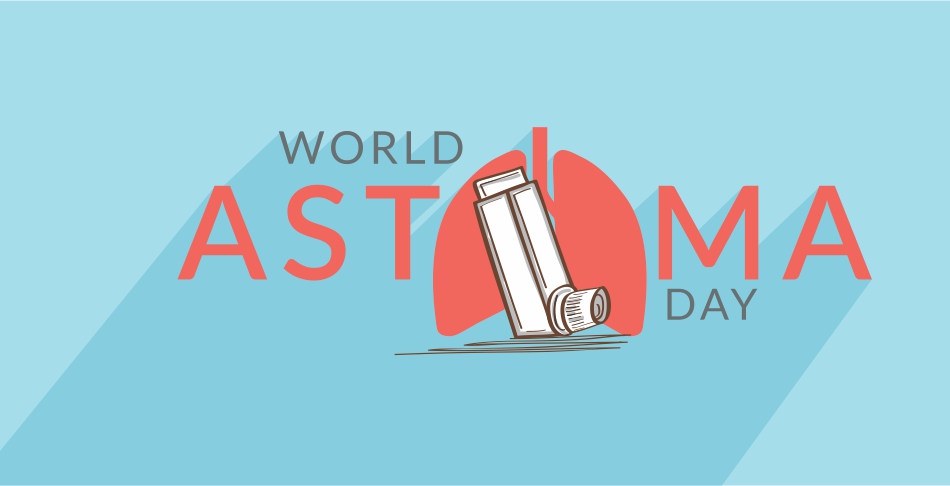World Asthma Day: Busting Myths about Asthma
World Asthma Day: Busting Myths about Asthma
Published on May 4, 2021. EST READ TIME: 3 minutes

According to World Health Organization (WHO) estimates, there were more than 339 million people with asthma globally in 2016, with 417,918 asthma-related deaths. As per the WHO report, most of the asthma-related deaths occur in low or lower-middle-income countries such as India and many Asian and African countries.
The World Asthma Day is observed on May 5 to raise awareness and educate people all over the world about the disease’s management. Each year, the organising body selects a theme, and this year’s theme is “Uncovering Asthma Misconceptions”.
What is Asthma?
Asthma is a chronic disease that affects the air passage of the lungs, causing severe respiratory problems. It is a non-communicable disease that causes the airways to swell, narrow, and produce extra mucus. Breathing becomes extremely as a result, and coughing, shortness of breath, and wheezing may occur.
Asthma may be a minor issue for some people, but it can be life threatening for others. Although asthma cannot be cured, it can be controlled with medication. By avoiding asthma triggers ,the severity of the disease can be reduced.
Symptoms
Asthma has a variety of symptoms, but the most common are squealing, whistling, or wheezing sounds made while breathing. Other asthma symptoms may include:
- Coughing while laughing or exercising
- Chest tightness or pain in the chest
- Shortness of breath
- Trouble sleeping due to shortness of breath, cough, or wheezing
Symptoms may vary from person to person. However, look out for these signs, which help to know if your asthma is getting worse.
-
The need of using quick-relief inhaler more often than usual
- More frequent asthma symptoms
- Increase in breathing difficulty, as measured using a peak flow meter
Treatment of Asthma
Your doctor will recommend one or a combination of the following treatments based on the type of asthma you have, your age, and your triggers.
- Breathing exercises: Breathing exercises can help increase lung capacity by getting more air into and out of the lungs. Check with your doctor or occupational therapist for the exercises.
- Long-term asthma medications: These medicines are usually consumed daily and include inhalers, pills, and combination inhalers. They help reduce the number and severity of asthma symptoms.
- Quick-relief medications: These medications help with short-term and rapid asthma symptoms and come handy during an asthma attack. Your doctor may also recommend you to take quick-relief medications before exercising or before most cardiovascular activities. One such medication is bronchodilator, which works within minutes to clear the airways.
- Allergy medications: These medications help to curb asthma symptoms caused by any types of allergies.
- Bronchial thermoplasty: This procedure is used to treat severe asthma. In this treatment, the electrode is used to heat the airwaves inside the lungs, helping to reduce the size of the muscles and prevent it from tightening.
Myths Surrounding Asthma
There are some misconceptions about asthma, and it is critical that we dispel these myths on World Asthma Day. Some of the myths are as follows:
- Asthma is a childhood disease and that people will be cured of it as they age
- It is infectious
- Asthma patients should avoid exercising
- Asthma can only be controlled with heavy doses of steroids
Truth about Asthma
- Asthma can occur at any age (childhood, adolescent, teenage, adult, and elderly)
- Asthma that starts right from childhood is often associated with allergies. However, which begins in adulthood is often less allergic.
- Asthma is not infectious. However, viral respiratory issues like flu and common cold can cause asthma attacks.
- If you are able to control the symptoms of asthma, you can exercise and even participate in sports.
- Low doses of steroids can help to control asthma
Conclusion
Asthma cannot be cured, but it can be controlled, and asthma attacks or exacerbations can be reduced if managed well. An asthmatic can enjoy good quality of life with appropriate asthma management. So, i If you suspect you have asthma and exhibit any of the above symptoms, consult your physician right away. Make sure you have a good health insurance policy that will cover you in the event of a severe asthmatic attacks that requires hospitalisation.
Disclaimer: The above information is for illustrative purpose only. For more details, please refer to policy wordings.










 Health Insurance
Health Insurance  Travel Insurance
Travel Insurance  Car Insurance
Car Insurance  Cyber Insurance
Cyber Insurance  Critical Illness Insurance
Critical Illness Insurance
 Pet Insurance
Pet Insurance
 Bike/Two Wheeler Insurance
Bike/Two Wheeler Insurance  Home Insurance
Home Insurance  Third Party Vehicle Ins.
Third Party Vehicle Ins.  Tractor Insurance
Tractor Insurance  Goods Carrying Vehicle Ins.
Goods Carrying Vehicle Ins.  Passenger Carrying Vehicle Ins.
Passenger Carrying Vehicle Ins.  Compulsory Personal Accident Insurance
Compulsory Personal Accident Insurance  Travel Insurance
Travel Insurance  Rural
Rural 











